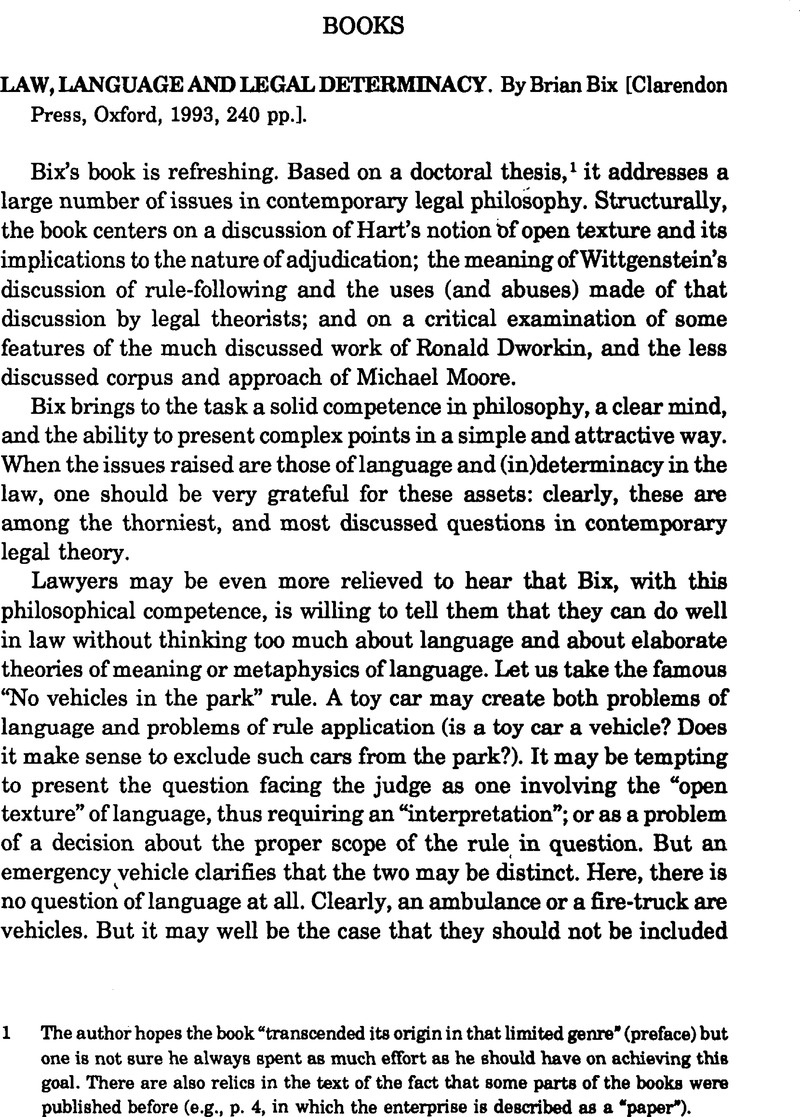No CrossRef data available.
Published online by Cambridge University Press: 04 July 2014

1 The author hopes the book “transcended its origin in that limited genre” (preface) but one is not sure he always spent as much effort as he should have on achieving this goal. There are also relics in the text of the fact that some parts of the books were published before (e.g., p. 4, in which the enterprise is described as a “paper”).
2 See, e.g., pp. 178–179: “Language and theories of language have been used as an excuse for decisions that are more properly attributable to political — or at least policy — decisions…”.
3 A powerful presentation of the stages theory of interpretation is given by Barak J. in Kenig v. Cohen (1982) 36(iii) P.D. 701. See also his Interpretation in the Law, Vol I: General Theory (Nevo Publishing, Jerusalem, 1992, in Hebrew) 120–126.
4 Bix defends this reading despite a note Hart wrote him in which he explicitly endorsed the second reading (p. 24). Can we conclude that the way philosophical texts should be read is by their best light and not by direct intent?
5 See especially his discussion of “easy cases” in chapter 3. While Bix seems to agree with H.L.A. Hart that the distinction between hard and easy cases is real and important, he points out many ways in which it is far from simple and clear. Similarly, the relationships between the distinction and language, discretion and determinacy are not simple and straightforward. Bix concedes, as all should, that some interpretations of, say, the equal protection clause seem natural to us, but would have seemed preposterous a generation ago, and that what may affect this are political and ideological changes, as the CLS people claim: (p. 45).
6 Kripke, S., Wittgenstein on Rules and Private Language (Harvard Press, 1982).Google Scholar Bix claims that “it is in fact very hard (if it is possible at all) to find a serious Wittgenstein scholar who is in substantial agreement with Kripke's reading” (p. 38).
7 Bix offers a detailed analysis and critique of the writings of Languille and Patterson.
8 p. 182. For a discussion of the difference between the two see Raz's analysis of authority, and Schauer, F., Playing By the Rules (Oxford, 1992).Google Scholar
9 And tells those who do not follow English opinions as closely as they should that the ban against consulting parliamentary records was partly lifted in 1992: Pepper v. Hart, [1992] 2 W.L.R. 1032; Bix, at 187.
10 Marmor, Andrei reaches the same conclusion: Interpretation and Legal Theory (Oxford, 1992) 155–172.Google Scholar
11 See my “Positivism, Natural law and the Limits of Jurisprudence: A Modem Round”, (1981) 91 Yale L.J. 1250 and my comment on Dworkin, in Issues in Contemporary Legal Philosophy (Oxford U.P., 1987) 21–34.Google Scholar